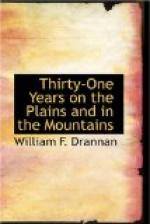On the morning of the third day in this camp, we all started out to kill some game for Juan to take back home. Mr. Hughes started out in one direction and Uncle Kit and I in the opposite. We had gone but a short distance, when, looking across a canyon, I saw a herd of some kind of animals and asked Uncle Kit what they were. He told me they were bison, and complimented me on having such good eyes.
Bison, by the way, is the distinctive name in that region for mountain buffalo, all buffalo belonging to the bison family.
We then started on a round-about way to try and get in gunshot of the herd, in which we were successful. When we had got in gunshot of them and he had pointed out the one for me to shoot at, he said:
“Now take a rest on that big rock, and when I count three, pull the trigger, and be sure that you break its neck.”
The guns went off so near together that I turned and asked Uncle Kit why he didn’t shoot, too, for I did not think that he had fired; but as soon as the smoke from our guns had cleared away, I saw two bison kicking their last.
After dressing the animals we returned to camp and learned that Mr. Hughes had killed two deer, which, with the two bisons, were enough to load the pack-horses.
We were now in the extreme south end of South Park, which was mostly a prairie country, except along the streams, and more or less pine trees were scattered here and there along the hillsides.
Next morning we loaded the pack-horses with the game and Juan started back home, alone, with the horses.
After we had seen him off, we rolled up our blankets and taking enough provisions to last several days, we “packed up our packs” and pulled out up the Arkansas again.
This, to me, was like breaking a colt to the saddle, only I didn’t buck.
Notwithstanding I had a light pack, for I was a light subject, it was hard work for me. Mr. Hughes had been out the year before, and being a grown man, it did not worry him as it did me. However, we traveled very slowly, looking well all the time for beaver sign.
In the afternoon of the second day we came to where there was plenty of beaver sign. In fact the trees they had gnawed down were so thick that we could not travel along the river, but had to take to the hillsides.
We camped that night at the mouth of a little stream that empties into the Arkansas, and the following morning, after looking over the trapping ground, the two men selected a place to build our winter quarters, and we went to work. They worked at the cabin while I killed the game for our meat and did the cooking, my outfit being a frying-pan, a coffee-pot and a tin cup for each of us.
They were about two weeks getting our cabin, or dugout, completed. It was made by first digging out a place in the hillside, about twelve feet square, and building up the front with logs, then brush and pine boughs, and then the whole with dirt, the door was made of hewed logs, fastened together with crossed pieces by means of wooden pins, and it was hung on heavy wooden hinges.




